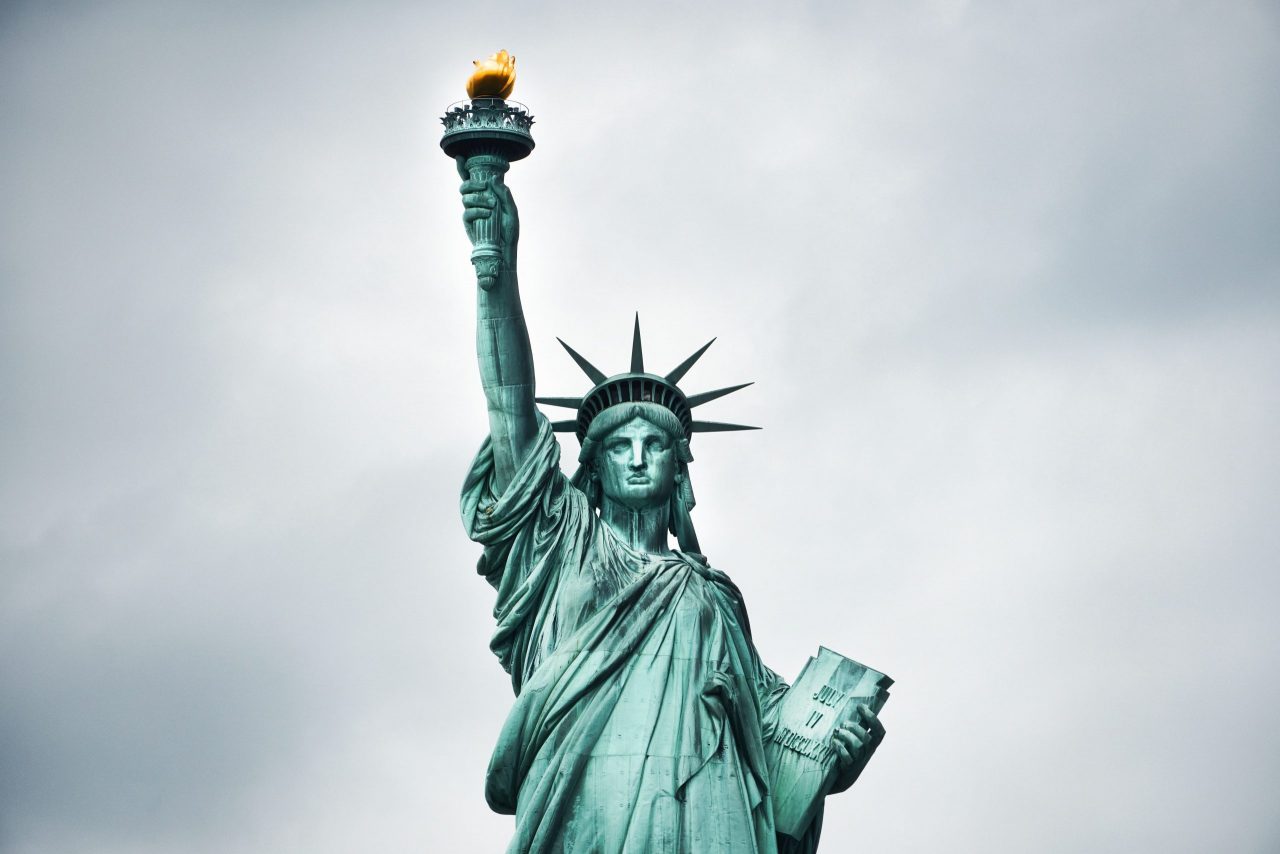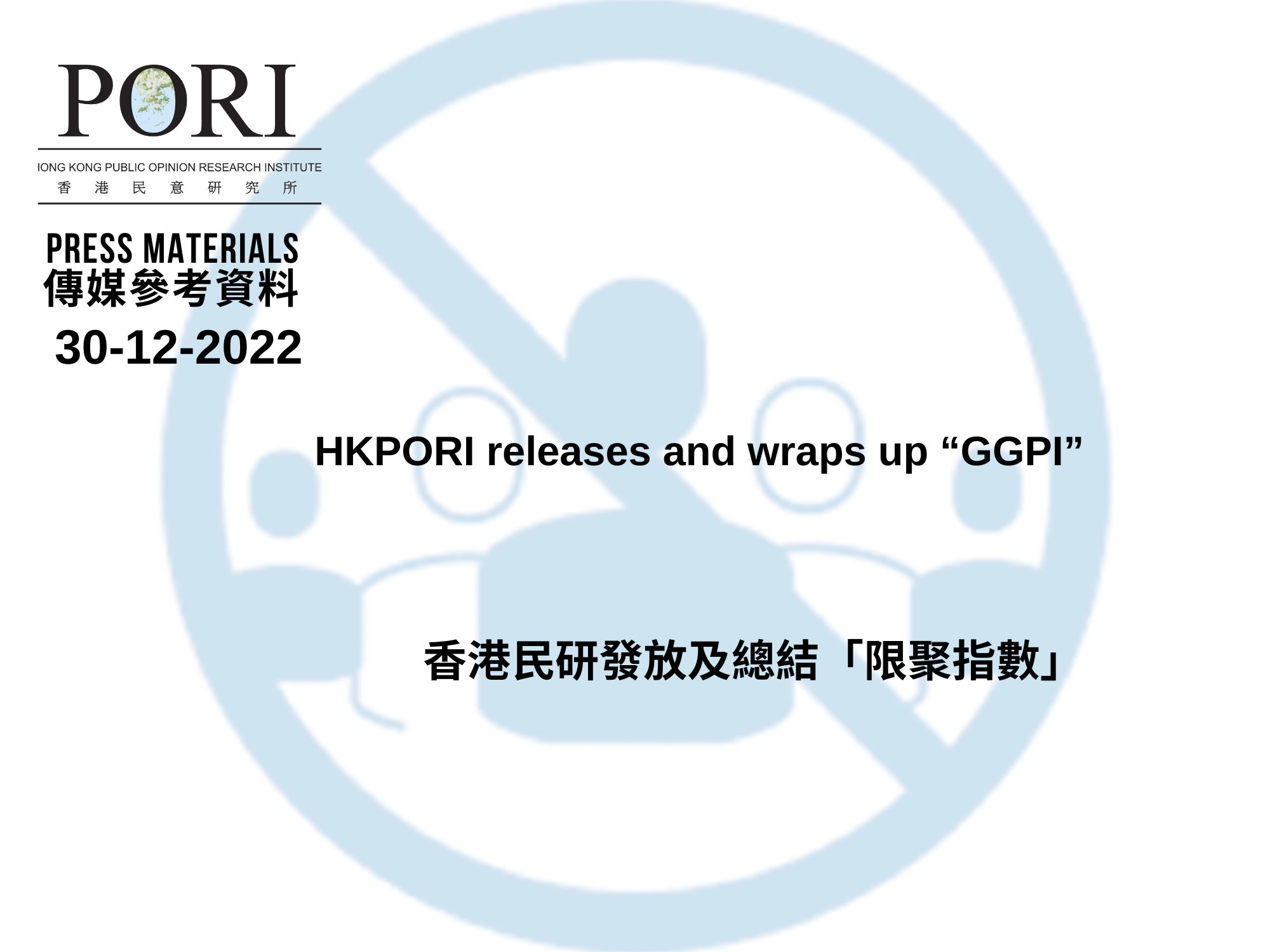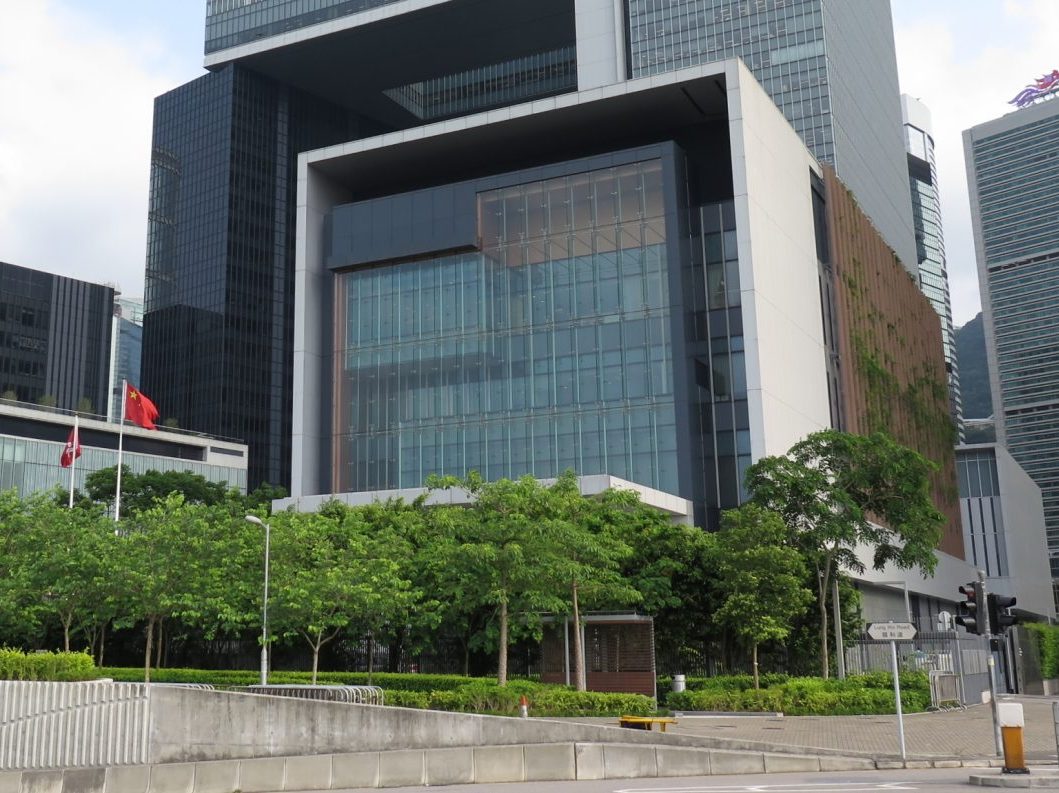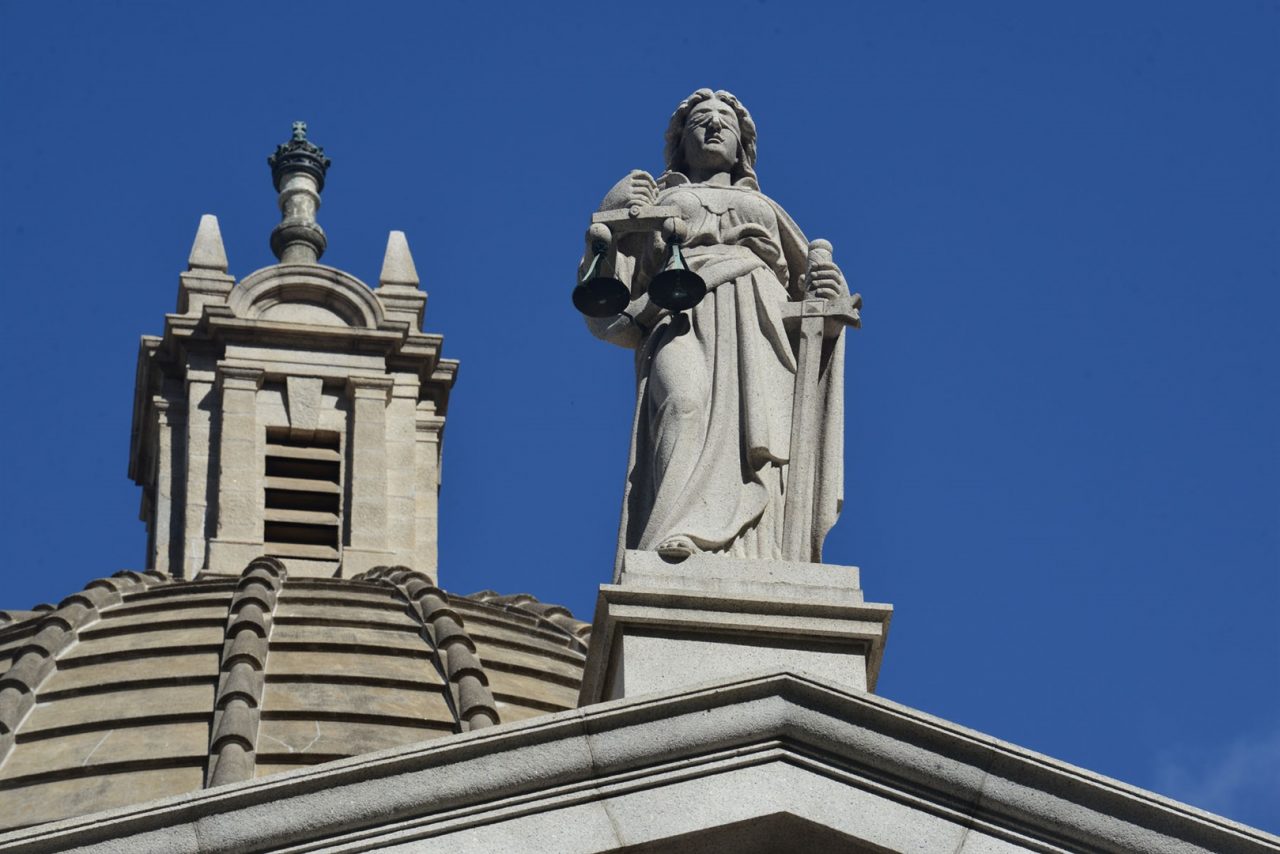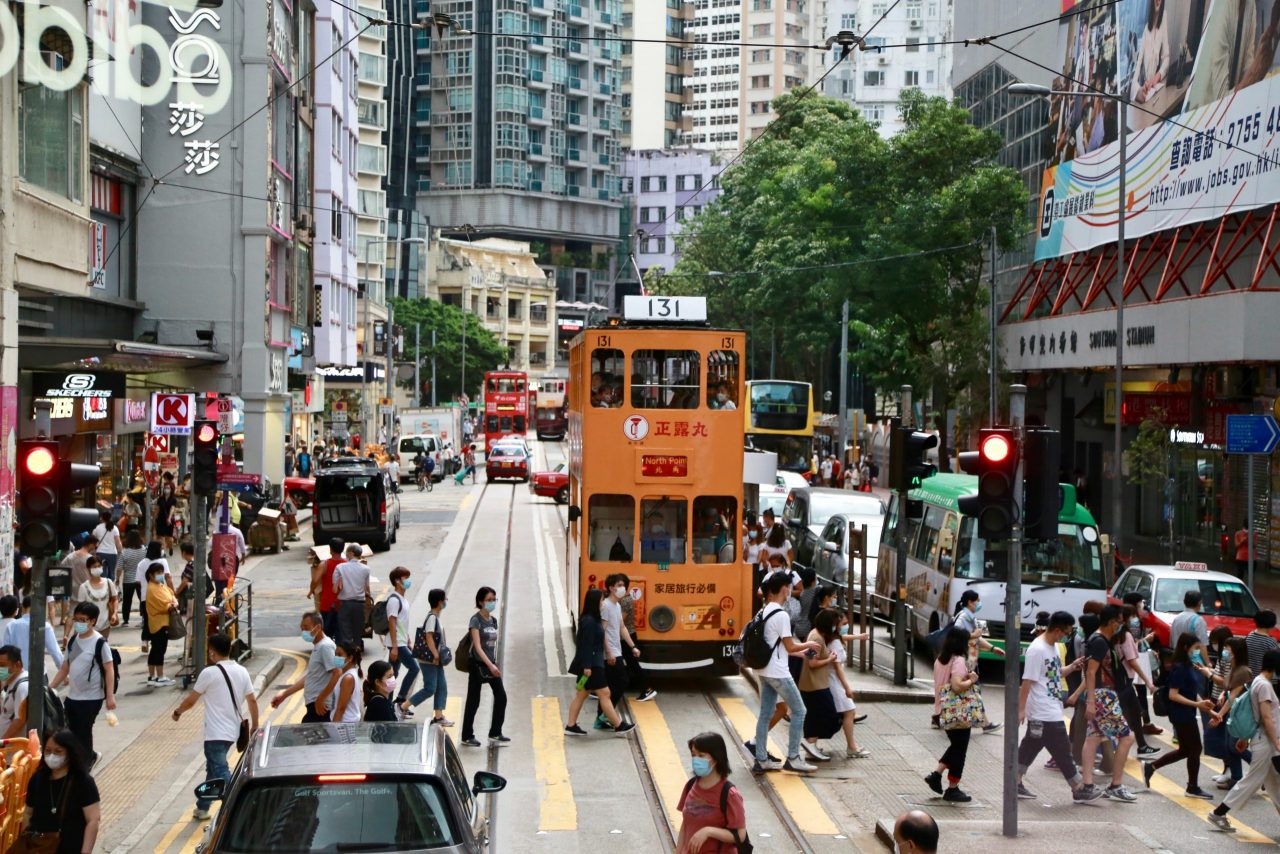Feb 15, 2022
Hong Kong Public Opinion Research Institute Press Conference – Press Materials
Speakers:
Robert Chung – President and CEO, HKPORI
Kim-Wah Chung – Deputy CEO, HKPORI
Derek Yuen – Current Affairs Commentator
Online Commentator:
Tung-Fai Cheung – Spokesman, Alliance of Revitalizing Economy and Livelihood
Detailed Findings
Special Announcement
The predecessor of Hong Kong Public Opinion Program (HKPOP) was The Public Opinion Programme at The University of Hong Kong (HKUPOP). “POP” in this release can refer to HKPOP or its predecessor HKUPOP.
Abstract
POP successfully interviewed 1,012 Hong Kong residents by a random telephone survey conducted by real interviewers in early February. Our survey shows that the latest popularity rating of CE Carrie Lam is 31.9 marks, with 34% of respondents giving her 0 mark. Her net popularity stands at negative 53 percentage points. Both have not changed much from a month ago. On a scale of 0 to 10, people’s ratings on the five core social indicators ranked from the highest to the lowest are “rule of law”, “freedom”, “prosperity”, “stability” and “democracy”. Their scores are 5.13, 5.09, 4.97, 4.94 and 4.25 respectively. Compared with a month ago, the “rule of law” and “freedom” indicators have increased significantly, while the rating of “rule of law” has registered a record high since May 2019. As for the seven non-core social indicators, “public order” got relatively higher rating, while those of “social welfare sufficiency”, “civilization”, “corruption-free practices”, “efficiency”, “equality” and “fairness” are relatively lower. Compared to the last survey, the rating of “efficiency” dropped significantly, while the ratings of “social welfare sufficiency”, “civilization”, “efficiency” and “equality” have all registered all-time lows since records began in 1997, while those of “public order” and “corruption-free practice” have registered record highs since May 2019. As for the ten freedom sub-indicators, freedom of “speech”, “freedom to strike”, “association”, “press”, “publication” and “procession and demonstration” all score lower than 5 marks. Freedom of “entering or leaving Hong Kong” has dropped significantly when compared to the last survey and registered a historical low since records began in 1997. In the area of rule of law sub-indicators, the “fairness of the judicial system” has registered a record high since May 2019, but it still scores below 5 marks. The latest support rating of Chief Justice Andrew Cheung stands at 46.5. The effective response rate of the survey is 58.1%. The maximum sampling error of percentages is +/-3%, that of net values is +/-5% and that of ratings is +/-2.6 at 95% confidence level.
Contact Information
| Date of survey | : | 7-10/2/2022 |
| Survey method | : | Random telephone survey conducted by real interviewers |
| Target population | : | Cantonese-speaking Hong Kong residents aged 18 or above |
| Sample size[1] | : | 1,012 (including 507 landline and 505 mobile samples) |
| Effective response rate | : | 58.1% |
| Sampling error[2] | : | Sampling error of percentages not more than +/-3%, that of net values not more than +/-5% and that of ratings not more than +/-2.6 at 95% conf. level |
| Weighting method | : | Rim-weighted according to figures provided by the Census and Statistics Department. The gender-age distribution of the Hong Kong population came from “Mid-year population for 2020”, while the educational attainment (highest level attended) distribution and economic activity status distribution came from “Women and Men in Hong Kong – Key Statistics (2020 Edition)”. |
- This figure is the total sample size of the survey. Some questions may only involve a subsample, the size of which can be found in the tables below.
- All error figures in this release are calculated at 95% confidence level. “95% confidence level” means that if we were to repeat a certain survey 100 times with different random samples, we would expect 95 times having the population parameter within the respective error margins calculated. Because of sampling errors, when quoting percentages, journalists should refrain from reporting decimal places, whereas one decimal place can be used when quoting rating figures.
Popularity of CE
Recent popularity figures of CE Carrie Lam are summarized as follows:
| Date of survey | 29/10-3/11/21 | 15-18/11/21 | 29/11-3/12/21 | 9-14/12/21 | 3-6/1/22 | 7-10/2/22 | Latest change |
| Sample size | 1,004 | 1,004 | 1,001 | 1,017 | 1,021 | 1,012 | — |
| Response rate | 50.1% | 53.7% | 44.9% | 58.0% | 52.7% | 58.1% | — |
| Latest findings | Finding | Finding | Finding | Finding | Finding | Finding & error | — |
| Rating of CE Carrie Lam | 35.7 | 37.4 | 34.6 | 35.8 | 33.8 | 31.9+/-1.9 | -1.9 |
| Vote of confidence in CE Carrie Lam |
23% | 24% | 21% | 21% | 19% | 18+/-2% | -1% |
| Vote of no confidence in CE Carrie Lam |
66% | 60%[3] | 66%[3] | 63% | 67% | 70+/-3% | +3% |
| Net approval rate | -42% | -36% | -45%[3] | -42% | -48% | -53+/-5% | -4% |
- The difference between the figure and the result from the previous survey has gone beyond the sampling error at 95% confidence level, meaning that the change is statistically significant prima facie. However, whether the difference is statistically significant is not the same as whether they are practically useful or meaningful, and different weighting methods could have been applied in different surveys.
Our latest survey shows that the popularity rating of CE Carrie Lam is 31.9 marks, with 34% of respondents giving her 0 mark. Her approval rate is 18%, disapproval rate 70%, giving a net popularity of negative 53 percentage points. The rating and net popularity have not changed much from a month ago.
Social and Freedom Indicators
Herewith the latest figures of the five core social indicators:
| Date of survey | 4-7/10/21 | 29/10-3/11/21 | 29/11-3/12/21 | 3-6/1/22 | 7-10/2/22 | Latest change |
| Sample size | 602-611 | 599-610 | 598-602 | 606-618 | 548-677 | — |
| Response rate | 62.9% | 50.1% | 44.9% | 52.7% | 58.1% | — |
| Latest findings | Finding | Finding | Finding | Finding | Finding & error | — |
| Compliance with the rule of law | 4.86 | 4.87 | 4.59 | 4.34 | 5.13+/-0.24 | +0.79[4] |
| Degree of freedom | 5.12 | 5.18 | 4.82[4] | 4.57 | 5.09+/-0.27 | +0.52[4] |
| Degree of prosperity | 5.26 | 5.35 | 4.77[4] | 4.89 | 4.97+/-0.21 | +0.07 |
| Degree of stability | 5.48[4] | 5.42 | 5.03[4] | 4.89 | 4.94+/-0.24 | +0.05 |
| Degree of democracy | 4.28 | 4.16 | 3.94 | 3.93 | 4.25+/-0.27 | +0.32 |
- The difference between the figure and the result from the previous survey has gone beyond the sampling error at 95% confidence level, meaning that the change is statistically significant prima facie. However, whether the difference is statistically significant is not the same as whether they are practically useful or meaningful, and different weighting methods could have been applied in different surveys.
Herewith the latest figures of the seven non-core social indicators:
| Date of survey | 14-17/4/20 | 6-9/7/20 | 2-5/2/21 | 9-12/8/21 | 7-10/2/22 | Latest change |
| Sample size | 627-663 | 616-665 | 650-656 | 633-642 | 548-554 | — |
| Response rate | 64.5% | 52.4% | 62.9% | 49.4% | 58.1% | — |
| Latest findings | Finding | Finding | Finding | Finding | Finding & error | — |
| Degree of public order | 5.13[5] | 5.14 | 5.70[5] | 5.99 | 6.10+/-0.21 | +0.11 |
| Degree of social welfare sufficiency | 5.56 | 5.63 | 5.43 | 5.54 | 5.36+/-0.21 | -0.18 |
| Degree of civilization | 6.00[5] | 5.42[5] | 5.58 | 5.57 | 5.32+/-0.23 | -0.25 |
| Degree of corruption-free practices | 4.98 | 4.98 | 5.00 | 5.04 | 5.25+/-0.25 | +0.21 |
| Degree of efficiency | 5.25[5] | 5.34 | 5.08 | 5.14 | 4.56+/-0.22 | -0.58[5] |
| Degree of equality | 4.87 | 4.62 | 4.50 | 4.39 | 4.31+/-0.23 | -0.08 |
| Degree of fairness | 4.79[5] | 4.15[5] | 4.23 | 4.32 | 4.31+/-0.23 | -0.01 |
- The difference between the figure and the result from the previous survey has gone beyond the sampling error at 95% confidence level, meaning that the change is statistically significant prima facie. However, whether the difference is statistically significant is not the same as whether they are practically useful or meaningful, and different weighting methods could have been applied in different surveys.
Herewith the latest figures of the ten freedom sub-indicators:
| Date of survey | 14-17/4/20 | 6-9/7/20 | 2-5/2/21 | 9-12/8/21 | 7-10/2/22 | Latest change |
| Sample size | 579-643 | 583-664 | 605-656 | 595-639 | 549-612 | — |
| Response rate | 64.5% | 52.4% | 62.9% | 49.4% | 58.1% | — |
| Latest findings | Finding | Finding | Finding | Finding | Finding & error | — |
| Degree of freedom (repeated listing) | 5.58[6] | 4.84[6] | 5.02 | 5.11 | 5.09+/-0.27 | -0.02 |
| Freedom of religious belief | 7.24[6] | 6.71[6] | 6.76 | 6.83 | 6.94+/-0.22 | +0.11 |
| Freedom to enter or leave Hong Kong | 7.02 | 6.50[6] | 6.08[6] | 6.37 | 5.66+/-0.28 | -0.71[6] |
| Freedom to engage in academic research |
5.59[6] | 4.98[6] | 4.88 | 5.12 | 5.44+/-0.26 | +0.32 |
| Freedom to engage in artistic and literary creation |
5.63[6] | 4.96[6] | 5.21 | 4.95 | 5.29+/-0.26 | +0.34 |
| Freedom of speech | 5.24[6] | 4.39[6] | 4.63 | 4.51 | 4.57+/-0.28 | +0.07 |
| Freedom to strike | 4.67[6] | 4.08[6] | 4.34 | 4.41 | 4.53+/-0.27 | +0.11 |
| Freedom of association | 4.88 | 4.35[6] | 4.17 | 4.07 | 4.35+/-0.28 | +0.28 |
| Freedom of press | 4.94[6] | 4.27[6] | 4.38 | 4.13 | 4.34+/-0.28 | +0.21 |
| Freedom of publication | 5.10[6] | 4.40[6] | 4.57 | 3.97[6] | 4.23+/-0.27 | +0.26 |
| Freedom of procession and demonstration | 4.13[6] | 3.31[6] | 3.31 | 3.45 | 3.63+/-0.29 | +0.17 |
- The difference between the figure and the result from the previous survey has gone beyond the sampling error at 95% confidence level, meaning that the change is statistically significant prima facie. However, whether the difference is statistically significant is not the same as whether they are practically useful or meaningful, and different weighting methods could have been applied in different surveys.
Herewith the latest figures of the two rule of law sub-indicators and the rating of the Chief Justice:
| Date of survey | 14-17/4/20 | 6-9/7/20 | 2-5/2/21 | 9-12/8/21 | 7-10/2/22 | Latest change |
| Sample size | 641-658 | 584-643 | 538-657 | 568-670 | 668-678 | — |
| Response rate | 64.5% | 52.4% | 62.9% | 49.4% | 58.1% | — |
| Latest findings | Finding | Finding | Finding | Finding | Finding & error | — |
| Compliance with the rule of law (repeated listing) | 4.45 | 4.14 | 4.50[8] | 5.06[8] | 5.13+/-0.24 | +0.07 |
| Impartiality of the courts | 4.60[8] | 4.24[8] | 4.42 | 4.98[8] | 5.03+/-0.24 | +0.05 |
| Fairness of the judicial system | 4.41 | 4.07[8] | 4.27 | 4.40 | 4.67+/-0.23 | +0.28 |
| Support rating of Chief Justice of the Court of Final Appeal[7] | 57.3 | 57.1 | 42.5[8] | 46.1 | 46.5+/-2.6 | +0.4 |
- The Chief Justice of the Court of Final Appeal before January 2021 was Geoffrey Ma, after that it was Andrew Cheung.
- The difference between the figure and the result from the previous survey has gone beyond the sampling error at 95% confidence level, meaning that the change is statistically significant prima facie. However, whether the difference is statistically significant is not the same as whether they are practically useful or meaningful, and different weighting methods could have been applied in different surveys.
On a scale of 0 to 10, people’s ratings on the five core social indicators ranked from the highest to the lowest are “rule of law”, “freedom”, “prosperity”, “stability” and “democracy”. Their scores are 5.13, 5.09, 4.97, 4.94 and 4.25 respectively. The ratings of “rule of law” and “freedom” have registered significant increases compared with a month ago, while the rating of “rule of law” has registered a record high since May 2019.
As for the non-core indicators, “public order” got relatively higher rating with 6.10 marks. Ratings of “social welfare sufficiency”, “civilization”, “corruption-free practices”, “efficiency”, “equality” and “fairness” stand at 5.36, 5.32, 5.25, 4.56, 4.31 and 4.31 marks respectively. The rating of “efficiency” dropped significantly compared with half a year ago, while the ratings of “social welfare sufficiency”, “civilization”, “efficiency” and “equality” have all registered all-time lows since records began in 1997, while those of “public order” and “corruption-free practice” have registered record highs since May 2019.
As for the freedom sub-indicators, the top 3 go to freedoms of “religious belief”, “entering or leaving Hong Kong” and “academic research”, with 6.94, 5.66 and 5.44 marks respectively, followed by freedom of “artistic and literary creation”, “speech”, “freedom to strike”, “association”, “press” and “publication”, with 5.29, 4.57, 4.53, 4.35, 4.34 and 4.23 marks respectively, while freedom of “procession and demonstration” ranks the last, scoring 3.63 marks only. Compared with the previous survey, freedom of “entering or leaving Hong Kong” has dropped significantly and registered a historical low since records began in 1997.
As for the two rule of law sub-indicators, “impartiality of the courts” got 5.03 marks, while “fairness of the judicial system” got 4.67 marks which has registered a record high since May 2019. As for Chief Justice Andrew Cheung, his support rating is 46.5 on a scale of 0 to 100.
Opinion Daily
In 2007, POP started collaborating with Wisers Information Limited whereby Wisers supplies to POP a record of significant events of that day according to the research method designed by POP. These daily entries would then become “Opinion Daily” after they are verified by POP.
For some of the polling items covered in this press release, the previous survey was conducted from 9 to 12 August, 2021 while this survey was conducted from 7 to 10 February, 2022. During this period, herewith the significant events selected from counting newspaper headlines and commentaries on a daily basis and covered by at least 25% of the local newspaper articles. Readers can make their own judgment if these significant events have any impacts to different polling figures.
| 6/2/22 | Hong Kong reports over 300 cases of COVID-19 for two consecutive days. |
| 31/1/22 | Secretary for Home Affairs Caspar Tsui announces his resignation. |
| 27/1/22 | The government extends anti-epidemic measures until February 17 and announces the launch of “vaccine pass” on February 24. |
| 26/1/22 | Hong Kong Society for the Protection of Children releases the First Interim Independent Review Committee Report on alleged child abuse at the Children’s Residential Home. |
| 21/1/22 | The government announces five-day lockdown at Yat Kwai House in Kwai Chung Estate for mandatory virus testing due to the outbreak of COVID-19. |
| 18/1/22 | The government culls 2,000 animals after a hamster contracts COVID-19. |
| 14/1/22 | The government extends anti-epidemic measures until February 3 and announces details for the fifth round of the Anti-epidemic Fund. |
| 7/1/22 | All 170 guests attending the birthday party of Witman Hung receives COVID-19 testing and are sent to quarantine. |
| 29/12/21 | Stand News closes after seven senior staff members are arrested. |
| 20/12/21 | 90 members of Legislative Council are elected. |
| 23/11/21 | The government announces the extension of mandatory use of “LeaveHomeSafe” app to more premises starting from December 9. |
| 9/10/21 | The Observatory revises its forecast of tropical cyclone warning signals repeatedly. |
| 8/10/21 | The government publishes the “Hong Kong 2030+” strategic planning final report. |
| 7/10/21 | The Policy Address proposes developing the “Northern Metropolis”. |
| 24/9/21 | China’s Ministry of Foreign Affairs publishes the “Fact Sheet: U.S. Interference in Hong Kong Affairs and Support for Anti-China, Destabilizing Forces”. |
| 20/9/21 | 364 members of the Election Committee are elected. |
| 20/9/21 | Various property stocks plummet while rumour has it that the Central Government is putting pressure on Hong Kong property developers. |
| 22/8/21 | A traffic accident at Tai Po causes 1 death and 9 injuries. |
| 18/8/21 | Police arrests four members of the HKU Students’ Union who allegedly advocated terrorism. |
Data Analysis
Our survey shows that the latest popularity rating of CE Carrie Lam is 31.9 marks, with 34% of respondents giving her 0 mark. Her net popularity stands at negative 53 percentage points. Both have not changed much from a month ago.
On a scale of 0 to 10, people’s ratings on the five core social indicators ranked from the highest to the lowest are “rule of law”, “freedom”, “prosperity”, “stability” and “democracy”. Their scores are 5.13, 5.09, 4.97, 4.94 and 4.25 respectively. Compared with a month ago, the “rule of law” and “freedom” indicators have increased significantly, while the rating of “rule of law” has registered a record high since May 2019.
As for the seven non-core social indicators, “public order” got relatively higher rating, while those of “social welfare sufficiency”, “civilization”, “corruption-free practices”, “efficiency”, “equality” and “fairness” are relatively lower. Compared to the last survey, the rating of “efficiency” dropped significantly, while the ratings of “social welfare sufficiency”, “civilization”, “efficiency” and “equality” have all registered all-time lows since records began in 1997, while those of “public order” and “corruption-free practice” have registered record highs since May 2019.
As for the ten freedom sub-indicators, freedom of “speech”, “freedom to strike”, “association”, “press”, “publication” and “procession and demonstration” all score lower than 5 marks. Freedom of “entering or leaving Hong Kong” has dropped significantly when compared to the last survey and registered a historical low since records began in 1997.
In the area of rule of law sub-indicators, the “fairness of the judicial system” has registered a record high since May 2019, but it still scores below 5 marks. The latest support rating of Chief Justice Andrew Cheung stands at 46.5.
